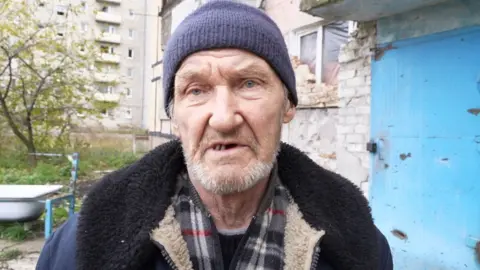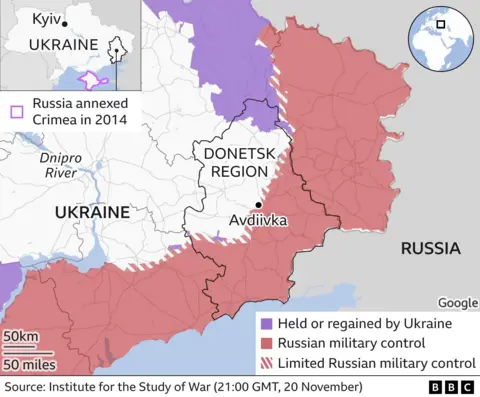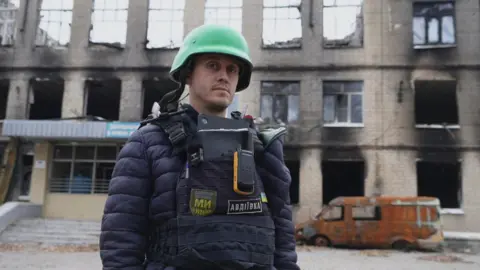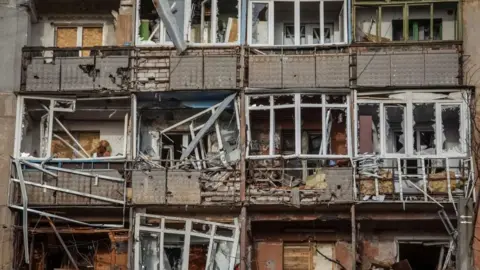Ukraine war: Facing a harsh winter on the front line
Ukraine's energy infrastructure has come under attack from Russia once again this week, leaving millions without power. As temperatures drop below freezing around the country, there are fears Moscow - struggling to win the war it started - is "weaponising winter". And nowhere is it clearer what that might look like than at the towns along the front line in the east.
People in Avdiivka have learnt how to distinguish an incoming shell from an outgoing one by its sound. But often there is no use in hiding. Pieces of shrapnel can pierce through metal doors like paper.
"At war," says Anatoliy, "you don't get accidentally killed. You accidentally survive."
The 71-year-old had to move to a basement after his apartment was destroyed in a fire caused by shelling. He is too afraid to leave the shelter now.
"To go to a shop or to take garbage out is an act of bravery," he says. "You never know whether you will come back or not."

Avdiivka has been at the front line since 2014 when the conflict in eastern Ukraine started. After Russia invaded Ukraine last February, many predicted that the town would quickly fall. Yet it is still controlled by Ukrainian forces. In a way, Avdiivka has become a symbol of Russia's failure in the Donbas.
Relentless bombardments, however, have turned it into a ghost town. Its bustling streets with colourful murals painted on buildings are now deserted.
Vitaliy Barabash, the head of Avdiivka's military administration, says that Russian forces continue their attempts to encircle the town from the south and the north.
"They can't launch a direct assault because our positions are well fortified here, so their tactic is simple - raze everything to the ground, constant bombardment using artillery and multiple rocket launchers."

Despite daily attacks, there are about 2,000 people remaining in Avdiivka. Many of them survive thanks to humanitarian aid provided by local and international organisations.
Most people have no income left now.
Before the war, Oleksiy Savkevich used to organise art festivals and youth events in Avdiivka. Now he delivers food parcels in a war zone, wearing body armour.
"Pensioners cannot withdraw money and people lost their jobs, so they rely heavily on food supplies volunteers deliver," he says.

With temperatures dropping, a new enemy emerges - the cold.
Most people pin their hopes on an old metal stove called a burzhuika, which was popular a century ago. There is no gas or running water.
To stay in touch with the outside world, people gather in the mornings at the only place that has electricity and a mobile network.
Local authorities set up a facility with a generator to power a mobile antenna. Visitors sit on stairs swiping their phone screens hungry to learn the latest news. There is a table at the entrance littered with extension cables and charging devices. The beeping sound of received messages breaks through the silence.
Almost everyone here say they don't want to leave the town.
"I am not ready to stay in camps and move from place to place like the homeless," one woman says. "And I can't afford to rent a flat," she adds.
Another man explains that he is not leaving because of his grandmother who is adamant she will remain in Avdiivka.
 Reuters
ReutersLocal authorities, however, are calling on people to be evacuated as soon as possible. They warn that many residents will not survive the coming winter.
"We tell them that we will not be able to provide food, we will not be able to evacuate people even if someone decides to leave because the roads will not be cleared [of snow]," Mr Barabash says.
"We tell people - do you understand that even if you don't starve to death, then you may simply freeze to death?"
Emergency services are not working in the town and medical assistance is extremely limited. There is one doctor who now lives in the hospital. He is worried that there will be a spike of diseases with people living in extreme conditions.

Elena, 60, still lives in her damaged flat. Windows are shattered and the floor may collapse any moment. The building was hit by an artillery shell, which left a big hole in the wall. Without gas and electricity, she cooks food on a fire outside the apartment block.
"Maybe I'll leave. If they shell this place again, they can blow up the whole building. All those flats that are below mine are destroyed," she says.
As Elena waits for her soup to be cooked, an artillery shell flies over us and lands a few hundred meters away. We have to go inside to take cover.
The sounds of explosion and gunfire remind everyone that the winter in Avdiivka holds many dangers.
